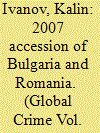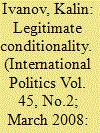| Srl | Item |
| 1 |
ID:
095018


|
|
|
|
|
| Publication |
2010.
|
| Summary/Abstract |
For both objective and subjective reasons, the European Union devoted unprecedented attention to the problem of corruption in Bulgaria and Romania. The European Union (EU) faced a complex challenge in wielding its arsenal of carrots and sticks to encourage reform in the two countries. Conditionality was further complicated by rivalries between Sofia and Bucharest. Despite its limits, EU pressure presented a rare opportunity to depoliticise anti-corruption policy. After accession, Romania regressed from its previous achievements against corruption, and Bulgaria remained reluctant to prosecute senior officials or confront organised crime. Nevertheless, the European Commission continued its monitoring activities, and its ability to freeze funds maintained a modicum of pressure for reform. More effective anti-corruption efforts are possible if a domestic constituency for reform gains sufficient momentum to replace the EU's waning influence.
|
|
|
|
|
|
|
|
|
|
|
|
|
|
|
|
| 2 |
ID:
086302


|
|
|
|
|
| Publication |
2008.
|
| Summary/Abstract |
This article analyzes European Union (EU) conditionality regarding the safety of Central and East European nuclear power reactors. Bulgaria, Lithuania, and Slovakia breached or evaded shutdown pledges made in exchange for foreign aid in the early 1990s. Conditionality proved more effective when the European Commission required reactor closure as a condition for accession. However, EU pressure gave rise to legitimacy concerns, as candidate country governments agreed to phase out reactors against the wishes of their citizens. The resultant problems exposed inherent discrepancies between conditionality and democracy. Such discrepancies cannot be resolved by the illusory concept of 'ownership'. Bridging two literatures, the article examines EU conditionality in the context of enlargement's 'democratic deficit'. Previously overlooked factors that discredit conditionality include stereotyping, symbolism, the reluctance to admit mistakes, and popular conspiracy theories about donor motives. Greater attentiveness to such factors can enhance conditionality's legitimacy.
|
|
|
|
|
|
|
|
|
|
|
|
|
|
|
|